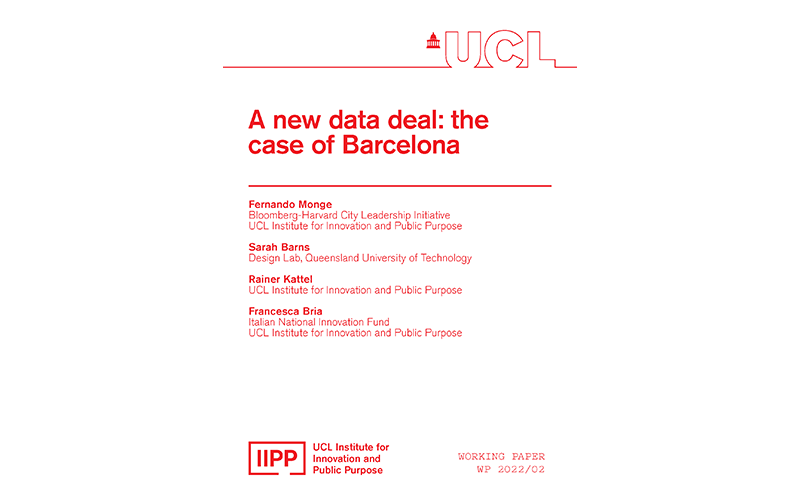A new data deal: the case of Barcelona
This paper examines how the City of Barcelona is becoming one of the leading advocates of citizen-first data rights and data sovereignty agenda with a consideration of lessons for other cities.

18 February 2022
UCL Institute for Innovation and Public Purpose (IIPP) Working Paper Series: IIPP WP 2022/02
Authors:
- Fernando Monge | Bloomberg-Harvard City Leadership Initiative | UCL Institute for Innovation and Public Purpose
- Sarah Barns | Design Lab, Queensland University of Technology
- Rainer Kattel | UCL Institute for Innovation and Public Purpose
- Francesca Bria | Italian National Innovation Fund | UCL Institute for Innovation and Public Purpose
Reference:
Monge, F., Barns, S., Kattel, R and Bria, F. (2022) A new data deal: the case of Barcelona. UCL Institute for Innovation and Public Purpose, Working Paper Series (No. WP 2022/02). Available at: https://www.ucl.ac.uk/bartlett/public-purpose/wp2022-02
Abstract:
Cities today are key sites for the operation of global digital marketplaces. It is at the curbsides and the intersections of cities where global digital platforms gain access to valuable urban data to be used in the delivery of data-driven urban services. Signalling an emerging role for city governments in contributing to regulatory responses to global digital platforms, a number of cities have in recent years tested their capacity to reclaim the urban data that is ‘harvested’ and monetised by digital platforms for improved local governance and participation. Focusing on the City of Barcelona, this paper investigates the conditions that enabled Barcelona to pivot from its strong focus on attracting commercial platforms under the rubric of smart city programs, to becoming one of the leading advocates of a citizen-first data rights and data sovereignty agenda. Through a series of interviews with key participants involved in the design and implementation of Barcelona’s data sovereignty program under Mayor Ada Colau, the paper examines the policy and governance instruments deployed by the city to regain access and control over data and discusses the challenges and tensions it faced during the implementation phases of the program. Finally, the paper presents the main lessons of the Barcelona experience for other cities, including a reflection on the role that cities can play in shaping a global agenda around improved data governance.
 Close
Close

